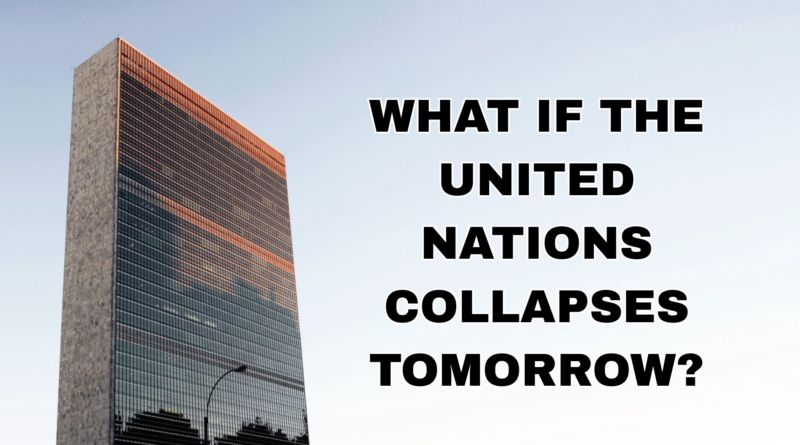WHAT IF THE UNITED NATIONS COLLAPSES TOMORROW?
The United Nations (UN) has been one of the most important organizations in the world since 1945. It was created after World War II to bring countries together, solve global problems, and prevent another world war. Today, it has 193 member countries and deals with peace, health, human rights, climate change, and more. But what if the UN suddenly collapses tomorrow? What would the world look like without it? Let us explore this big “what if” question.
No Common Table for Peace
The first and biggest effect would be the loss of a common table where world leaders meet to talk. The UN provides a platform where big and small nations can raise their voices. Without it, there would be no regular place for countries to discuss disputes, negotiate peace, or share their concerns.
This could mean more wars and conflicts. Countries may act on their own without seeking peaceful solutions. For example, border disputes, trade conflicts, or regional wars could quickly turn violent because there would be no neutral space like the UN to calm things down.
Rise of Power Politics
If the UN collapses, powerful countries like the United States, China, or Russia may try to take control of global affairs. Without a shared system, the world might move back to a time when stronger nations dominate weaker ones. Smaller countries would lose protection and support.
For example, if two small countries are fighting, who would stop the war? Earlier, the UN could send peacekeepers. Without the UN, powerful nations might interfere only if it benefits them. This could create unfairness, and the idea of equal rights among nations would fade away.
Global Health at Risk
The UN also runs the World Health Organization (WHO), which plays a big role in fighting diseases. Without it, the world would be less prepared for pandemics like COVID-19. Countries may struggle to share vaccines, medicines, or research. Poorer nations might be left behind in health care, leading to more deaths and suffering.
International cooperation in health would weaken. Imagine if a new virus spreads — without the WHO, every country would fight alone. This would make the world more dangerous and less safe.
Human Rights in Danger
The UN is also known for protecting human rights through its Human Rights Council. It speaks out against oppression, unfair treatment, and crimes against humanity. Without the UN, many governments could violate the rights of their citizens without fear of international pressure.
For example, dictators could silence people, arrest journalists, or punish minorities without anyone stopping them. Victims of injustice would have no global body to appeal to. Human rights, which are already fragile, could become even weaker.
No Help for Refugees and Poor Countries
Millions of refugees around the world depend on the UN’s Refugee Agency (UNHCR). If the UN collapses, who will take care of displaced people from war zones like Syria, Afghanistan, or Sudan? Refugees might be left homeless and without protection.
Poor countries also depend on UN programs for food, clean water, and development aid. The UN’s World Food Programme (WFP) feeds millions of hungry people. If this help disappears, hunger and poverty would rise quickly.
Climate Change Fight Slows Down
Climate change is one of the biggest threats to humanity. The UN plays a key role in organizing climate talks, like the Paris Agreement. Without it, countries may stop working together to cut pollution. Each country may do only what benefits itself, while ignoring the global impact.
This could make climate change worse. Sea levels may rise faster, extreme weather events may become more deadly, and millions of people could lose their homes. The fight against climate change needs unity, and without the UN, unity may be lost.
Rise of New Alliances
If the UN collapses, new groups and alliances may form. For example, regional organizations like the European Union, African Union, or ASEAN in Asia may try to fill the gap. But these groups cannot cover the whole world. They may focus only on their regions, leaving global problems unsolved.
Also, rival alliances may emerge. One group may follow the U.S., another may follow China, and another may follow Russia. This could divide the world into camps, increasing tension and the risk of new wars.
Global Trade and Economy
The UN also works with organizations like the World Trade Organization (WTO) and International Monetary Fund (IMF). If the UN collapses, global trade rules may become weaker. Rich countries may dominate trade deals, while poor countries suffer.
Economic inequality could grow, leading to more poverty, instability, and possibly even new conflicts.
Final Thoughts
If the United Nations collapses tomorrow, the world would become a more dangerous, unfair, and unstable place. Wars could increase, human rights could weaken, refugees might suffer, and the fight against global challenges like climate change and pandemics would slow down.
While the UN is not perfect and often criticized for being slow or influenced by powerful nations, it still provides hope and cooperation. Without it, the world would lose its only global platform for peace and unity.
The collapse of the UN would not just be the end of an organization – it could be the beginning of a darker, divided world. That is why, despite its flaws, the UN remains one of the most important pillars of global peace and cooperation.




